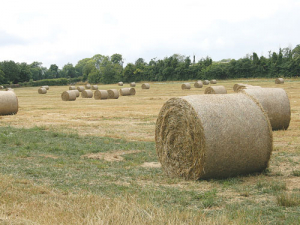Turning data into dollars
If growing more feed at home adds up to $428 profit per tonne of dry matter to your bottom line, wouldn’t it be good to have a ryegrass that gets you there quicker?
 In practice, silage is often not made at the optimal time, and little attention is paid to the silage-making process.
In practice, silage is often not made at the optimal time, and little attention is paid to the silage-making process.
Making high-quality pasture silage should not be difficult, but it must be viewed as a supplementary feed, rather than just a necessity to manage pasture.
NZ experimental results indicate that increasing silage quality by 2.3 MJ ME/kg DM increased MS production by 13, 17 and 41% in spring, summer and autumn, respectively. Higher quality feed will also increase BCS gain/kg DM eaten.
Making of silage should only be done from a true surplus and the objective is to preserve as many of the original nutrients as possible. In practice, however, silage is often not made at the optimal time, and little attention is paid to the silage-making process.
When grass is cut and left in a heap, it rots! Silage-making is the process of ‘pickling’ pasture to reduce the pH (acidity) to a level that stops the feed ‘rotting’ (i.e. stops microbial activity).
This is achieved through packing the pasture and covering it with plastic to exclude air, while microorganisms burn the sugars in the grass to produce lactic and acetic acid. If the silage is exposed to air (e.g. torn plastic) a chain reaction occurs that reduces silage quality.
Pasture silage can be made either in a field stack, a pit/concrete bunker (on top of the ground) or as bales. Provided the quality of the material going into the silage is the same and proper attention is paid to compacting and covering the pasture, pasture silage quality should be the same from either stack/pit or baled silage.
The decision to make bales or stack/pit silage is generally dependent on the farm system, the method of feeding silage and the infrastructure available for silage storage.
- Baled silage is more costly but enables flexibility of crop size and storage location onfarm and feeding out of small amounts on set occasions.
- Stack silage can also be stored in many locations and is cheaper than baled silage.
- Pit/bunker silage does not offer flexibility in storage but when properly used will result in less wastage. Pit silage is easier to compact and therefore to expel air.
Libby Judson is a keeper of memories from an age gone by. Tim Fulton tells her story.
A New Zealand-first native tree study has highlighted the Bioeconomy Science Institute's position as a forestry research leader.
Hemp fibre processor Rubisco is relocating its core processing facility to Ashburton as part of a $20-$30 million expansion to leverage what it says is an accelerating global demand for sustainable and renewable fibres.
Tradition meets some of the latest in technology at the 2026 East Coast Farming Expo.
OPINION: Trade Minister Todd McClay and the trade negotiator in government have presented Kiwis with an amazing gift for 2026 - a long awaited and critical free trade deal with India.
Former Agriculture Minister Nathan Guy says he's excited about his new role as NZ's Special Agricultural Trade Envoy.
President Donald Trump’s decision to impose tariffs on imports into the US is doing good things for global trade, according…
Seen a giant cheese roll rolling along Southland’s roads?